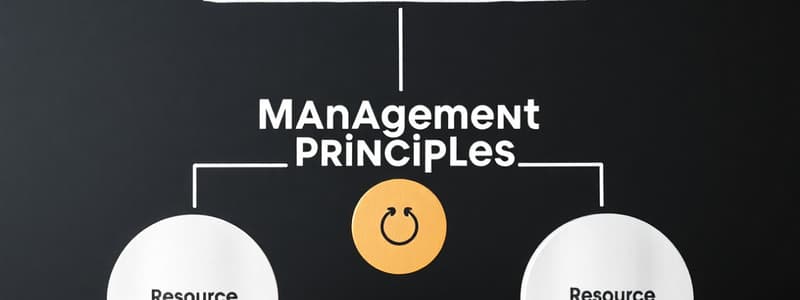Podcast
Questions and Answers
Which leadership style is likely to involve employees in decision-making processes?
Which leadership style is likely to involve employees in decision-making processes?
- Laissez-faire
- Autocratic
- Democratic (correct)
- Directive
What is the primary focus of Scientific Management?
What is the primary focus of Scientific Management?
- Enhancing employee morale
- Optimizing work processes (correct)
- Improving organizational structure
- Creating ethical guidelines
Which principle is NOT part of the controlling function in management?
Which principle is NOT part of the controlling function in management?
- Establishing standards
- Budget allocation (correct)
- Measuring performance
- Taking corrective action
What management theory emphasizes the importance of organizational structure and rules?
What management theory emphasizes the importance of organizational structure and rules?
Which challenge involves managing cultural differences in international operations?
Which challenge involves managing cultural differences in international operations?
What is one major concern of ethical considerations in management?
What is one major concern of ethical considerations in management?
Which of the following best describes Modern Management?
Which of the following best describes Modern Management?
Effective management is essential for what aspect of an organization?
Effective management is essential for what aspect of an organization?
What is the primary purpose of management?
What is the primary purpose of management?
Which principle of management involves defining roles and responsibilities?
Which principle of management involves defining roles and responsibilities?
What is an example of a SMART goal?
What is an example of a SMART goal?
Which of the following is NOT a part of the controlling process?
Which of the following is NOT a part of the controlling process?
What is the focus of the leading principle in management?
What is the focus of the leading principle in management?
Which of the following principles involves grouping employees based on their roles or functions?
Which of the following principles involves grouping employees based on their roles or functions?
What aspect of management does contingency planning address?
What aspect of management does contingency planning address?
Which aspect of leading is crucial for ensuring alignment within an organization?
Which aspect of leading is crucial for ensuring alignment within an organization?
Flashcards
What is management?
What is management?
The process of planning, organizing, leading, and controlling organizational resources (human, financial, material) to achieve goals effectively and efficiently.
Goal setting (Planning)
Goal setting (Planning)
Setting clear, measurable, achievable, relevant and time-bound goals to guide the organization.
Operational planning (Planning)
Operational planning (Planning)
Creating short-term plans to support strategic goals and day-to-day operations.
Organizing (Management Principle)
Organizing (Management Principle)
Signup and view all the flashcards
Leading (Management Principle)
Leading (Management Principle)
Signup and view all the flashcards
Controlling (Management Principle)
Controlling (Management Principle)
Signup and view all the flashcards
Motivation (Leading Principle)
Motivation (Leading Principle)
Signup and view all the flashcards
Communication (Leading Principle)
Communication (Leading Principle)
Signup and view all the flashcards
Laissez-faire leadership
Laissez-faire leadership
Signup and view all the flashcards
Controlling
Controlling
Signup and view all the flashcards
Scientific Management (Taylor)
Scientific Management (Taylor)
Signup and view all the flashcards
Employee Engagement
Employee Engagement
Signup and view all the flashcards
Conflict Resolution
Conflict Resolution
Signup and view all the flashcards
Behavioral Management
Behavioral Management
Signup and view all the flashcards
Planning
Planning
Signup and view all the flashcards
Autocratic Leadership
Autocratic Leadership
Signup and view all the flashcards
Study Notes
Defining Management
- Management is the process of coordinating resources (human, financial, material) to achieve organizational goals efficiently and effectively.
- It involves planning, organizing, leading, and controlling activities within an organization.
- Effective management requires understanding and applying various principles and theories.
Key Principles of Management
- Planning: Forecasting future needs and outlining strategies to meet them. This includes setting objectives, developing action plans, and allocating resources.
- Organizing: Structuring the organization to achieve its goals. This involves defining roles and responsibilities, delegating tasks, and establishing reporting lines.
- Leading: Motivating and guiding employees to achieve organizational goals. Effective leaders inspire, communicate effectively with teams, and foster a supportive work environment.
- Controlling: Monitoring performance against established standards and taking corrective actions as needed. This entails measuring progress, identifying deviations from plans, and implementing adjustments.
Planning Principles
- Goal setting: Establishing clear, measurable, achievable, relevant, and time-bound (SMART) goals.
- Forecasting: Predicting future trends and conditions to inform strategic planning.
- Strategic planning: Developing long-term plans for the overall direction of the organization.
- Operational planning: Creating short-term plans to support strategic goals.
- Contingency planning: Developing backup plans for potential problems or unexpected events.
Organizing Principles
- Division of labor: Dividing tasks into smaller, more specialized roles to improve efficiency.
- Hierarchy: Establishing clear lines of authority and reporting relationships.
- Span of control: Determining the number of subordinates a manager can effectively supervise.
- Departmentalization: Grouping employees based on function, product, or geography.
- Delegation: Empowering employees to make decisions and take responsibility for their work.
Leading Principles
- Motivation: Encouraging employees to perform at their best through various methods like incentives, recognition, and leadership styles.
- Communication: Sharing information effectively with employees to maintain alignment and ensure understanding of objectives.
- Leadership styles: Different styles (autocratic, democratic, laissez-faire) have varying effects on employee morale and performance.
- Teamwork: Promoting collaboration and coordination among employees to achieve common goals.
- Conflict resolution: Identifying and resolving conflicts in a constructive manner.
Controlling Principles
- Establish standards: Setting clear performance benchmarks.
- Measure performance: Regularly monitoring progress against established standards.
- Compare performance to standards: Evaluating the gap between actual and expected outcomes.
- Analyze deviations: Investigating the reasons for any differences.
- Take corrective action: Implementing strategies to address shortcomings and maintain alignment with goals.
Key Management Theories
- Scientific Management (Taylor): Focuses on optimizing work processes and worker efficiency through the scientific study of tasks.
- Administrative Management (Fayol): Highlights the fundamental principles of management that can be applied in any organization.
- Bureaucratic Management (Weber): Emphasizes structure, rules, and procedures to ensure efficiency and effectiveness.
- Behavioral Management: Focuses on understanding human behavior in the workplace, including motivation, leadership, and group dynamics.
- Modern Management: Incorporates elements from previous theories along with contemporary issues like technology, globalization and ethical considerations.
Management Challenges
- Globalization: Navigating international markets, cultural differences, and global competition.
- Technology: Adapting to technological advancements and integrating them into business operations.
- Economic Fluctuations: Handling economic downturns and periods of growth.
- Competition: Maintaining competitiveness through innovative strategies and cost-effectiveness.
- Ethical Considerations: Maintaining ethical standards in decision-making and business practices.
- Employee Engagement: Fostering a positive work environment and motivating employees.
Conclusion
- Effective management is crucial for organizational success.
- Understanding the principles of planning, organizing, leading, and controlling is fundamental.
- Continuous learning and adaptation to changing circumstances are essential for successful management.
Studying That Suits You
Use AI to generate personalized quizzes and flashcards to suit your learning preferences.




